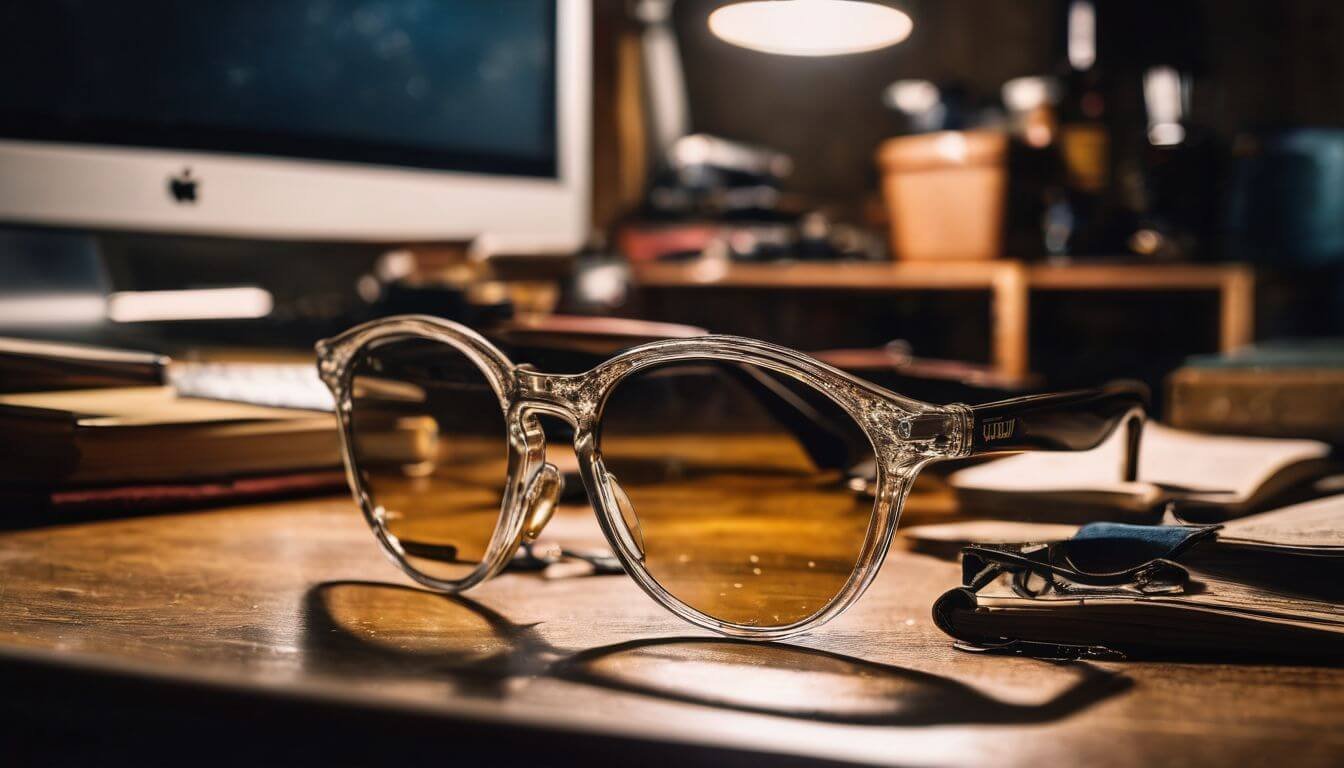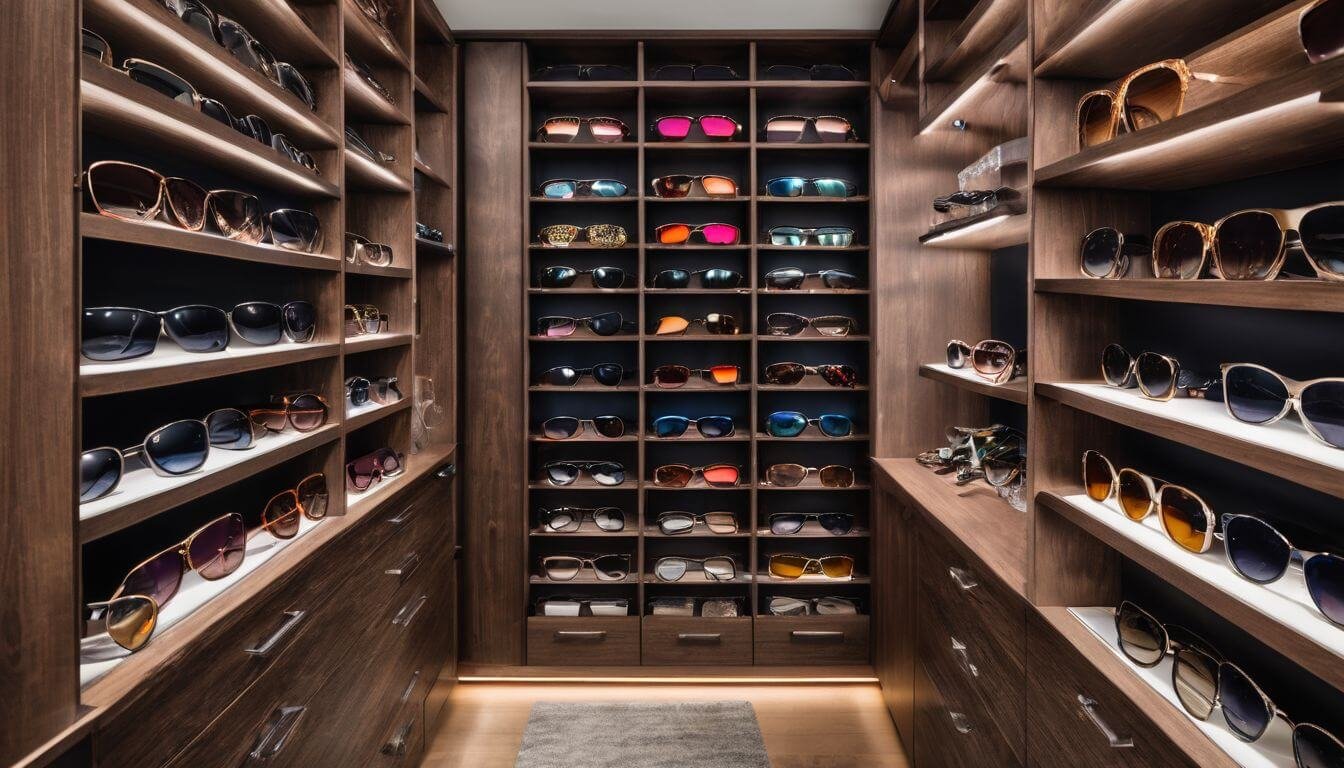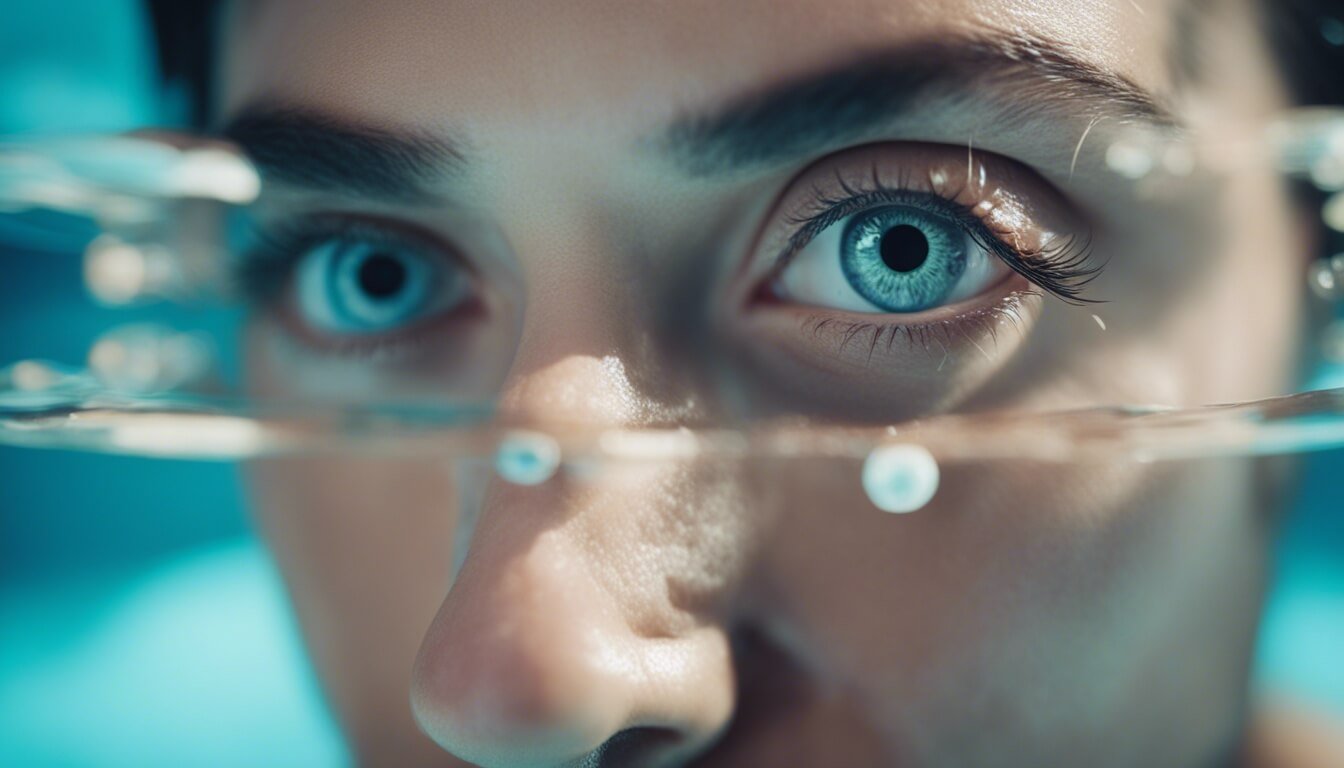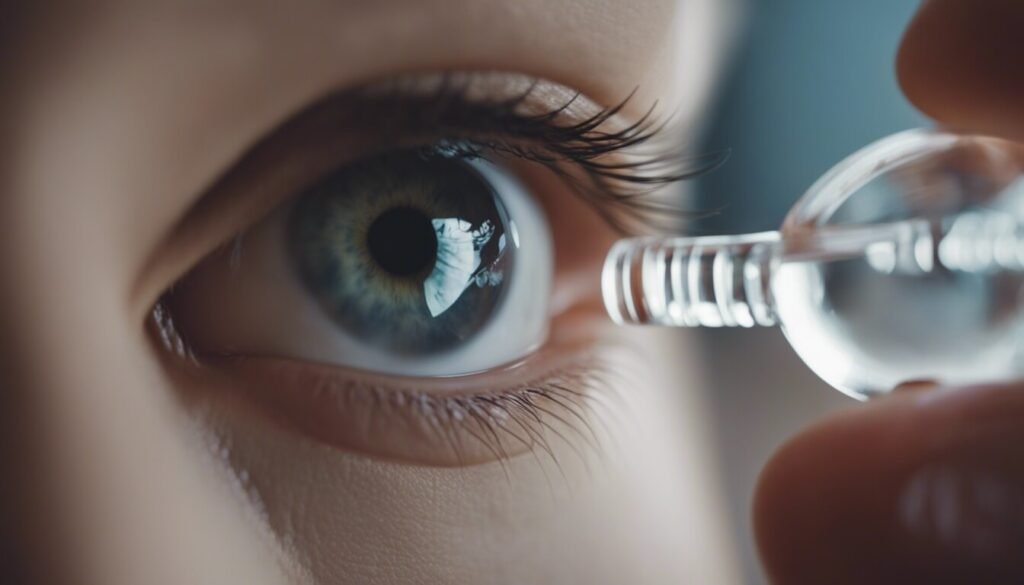
Can I Wear Contacts with Dry Eyes?
Have you ever blinked your way through a long day, feeling the scratchy discomfort of dry eyes with every glance? You’re not alone; many contact lens wearers struggle with this prickly problem.
Fear not, my friend, because we’ve got a treasure trove of tips and tricks to keep those peepers moist while rocking your contacts. Keep reading—we promise it’s worth the wink!
Key Takeaways
- Dry eyes happen when your tears aren’t keeping your eyes wet enough, and it can make wearing contact lenses uncomfortable.
- There are special soft contact lenses made for dry eyes that hold moisture well and others called rigid gas-permeable lenses that let in more air.
- Taking care of your contacts is important—clean them with the right solution and don’t wear them too long to help prevent dryness.
- Eye drops or artificial tears meant for use with contacts can add moisture to your eyes and make lenses more comfortable to wear.
- If home remedies don’t help with dry eye symptoms while wearing contacts, seeing an eye doctor is a good idea. They might suggest different contacts or treatments.
Overview of dry eye syndrome and its impact on contact lens wearers
Dry eye syndrome can be a real pain for folks who wear contact lenses. It happens when your eyes don’t make enough tears, or the tears they do make aren’t keeping your eyes wet like they should.
This can make your eyes feel scratchy, burn, or even look red. And let’s face it, that’s not fun for anyone.
For people who love wearing contacts, dry eye syndrome is extra bothersome. Contacts need a smooth and moist surface to sit comfortably on your eye. But if you have this condition, the lenses may start to feel like little pieces of sandpaper every time you blink.
Ugh! It’s important to get this sorted because ignoring it could mean trouble and lots of discomfort down the road.
Common symptoms and challenges
Ouch, dry eyes can sting and feel scratchy like you’ve got sand in them. Sometimes, they turn red or get tired easily. Those are some signs that your peepers could be on the dry side.
Now, imagine popping contacts into those thirsty eyes. It might seem okay at first, but as time ticks by—hello irritation! Contacts for dry eyes have to tackle this head-on; regular ones just make things worse.
Folks who try wearing their lenses all day often find their eyes even drier. They’re trapped in a blink-and-ouch cycle where every wink feels rough. Plus, staring at screens doesn’t help either – it’s like a dry-eye double whammy! But don’t lose hope if you love the no-glasses look.
With the right kind of lenses and maybe some smart eye drops (the type made for contact wearers), you can say goodbye to discomfort and keep your vision clear without ditching your contacts.

Causes and Symptoms of Dry Eye
Dry eyes can sneak up on you when your eyes don’t make enough tears. This could be from staring at screens too much or being in windy places. Even growing older or having allergies plays a part.
Simple things like not blinking enough can dry out your eyes, especially with contacts.
You know the drill—itchy, red, and tired eyes shout “dry eye” loud and clear. Contacts might make it feel like you’ve got sand in your eyes. If blinking hurts or lights are too bright, these are signs too.
Watch for these symptoms so you can keep those peepers happy while wearing your lenses!
Environmental and Lifestyle Factors
Sometimes, things around us can make our eyes dry. Windy days, smoky places, or staring at screens for too long without blinking enough can all lead to dry eye symptoms. Even the air inside can be a problem if it’s too dry or if there’s air conditioning blasting.
Your habits matter too. Drinking not enough water or having a lot of caffeine can dry out your body, including your eyes. Smoking is another big no-no—it’s bad for your eyes and can make them feel even dryer.
And let’s face it; we all love to wear contacts because glasses sometimes cramp our style, right? But hey, if you like wearing contacts and have dry eyes, don’t worry—we’ve got some tips coming up on how to keep those peepers happy!
Health Conditions and Medications
Some health issues and medicines can make your eyes dry. If your body doesn’t have enough water, or if you have a problem like allergies, your eyes might not make enough tears. This can cause them to feel scratchy or sore.
Certain drugs for things like colds or allergies might also dry out your eyes.
If you’re dealing with these troubles, talk to an eye doctor. They know all about eyes and can help find the cause of your dry eye. Once they figure it out, they might give you special drops that keep the eye moist.
You could get tips on how to care for your peepers while wearing contacts too!
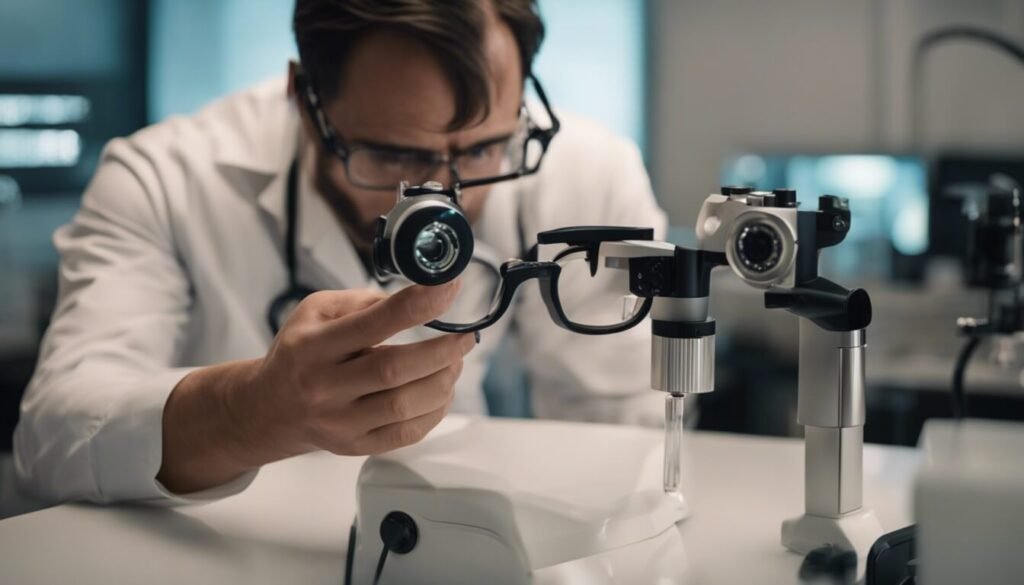
The Impact of Contact Lenses on Dry Eyes
Time to take charge of your blinkers! If dry eyes are bugging you, don’t just sit there. Get yourself some comfy contacts, splash on those eye drops and show ’em who’s boss. Need a genius eye doc? Go find one and chat about the best eyeball gear for you.
Remember, it’s all about keeping the peepers happy!
How Contact Lenses Exacerbate Dry Eye Symptoms
Contacts can be tough on dry eyes, you know. They sit right on the eye’s surface and soak up tears, which is what keeps eyes moist and happy. Think of it like a sponge that steals your eye’s wetness, leaving things kind of gritty and scratchy.
Sometimes even red and tired-looking – yikes! And if you’re wearing them way too long each day, they’ll make the dryness worse for sure.
People with contacts sometimes forget to blink enough – yup, blinking! It spreads tears over your eyes to keep them from drying out. Without enough blinks, contacts get all dry and uncomfortable.
Plus, some types are just not friends with dry eyes; they don’t let in enough oxygen or hold onto moisture well. So choosing the right ones is super important if you want to beat that annoying dry-eye feeling.
Contact Lens Materials and Dry Eye Discomfort
Some types of contact lenses can make dry eyes feel worse. Hard lenses might not let enough air pass through. Soft contacts could soak up tears from your eyes. You know, like a sponge? And if you wear them too long, even the best contact lenses can dry out your eyes and make them red or tired.
But hey, it’s not all bad news! There are special kinds of soft contacts made just for people with dry eyes. These have extra moisture or are designed to keep your eye’s surface slick and comfy.
It’s like giving your eyeballs a little spa treatment every time you blink! So, picking the right lens material is super important to help dodge that annoying scratchy feeling.
Choosing the Right Contact Lenses for Dry Eyes
Got dry eyes? Don’t let that stop you from wearing contacts! Find the perfect pair that feels great and keeps your eyes happy. Remember, a little care goes a long way—so use those drops and keep things clean.
Ready to blink in comfort? Talk to your eye doctor and get set with contacts made for you!
Soft Contact Lenses for Dry Eyes
Soft contact lenses might be a game changer for folks with dry eyes. Made of materials that hold water, they help keep your eyes moist and comfy. Think about them like tiny sponges on your eyes! Some soft lenses even have special coatings to lock in moisture which can make a big difference.
Your eye doctor can show you lenses made just for dry eyes. They work well because they let more oxygen through, letting your eyes breathe easier throughout the day. Plus, using drops made for contacts helps too; they add extra wetness whenever you need it.
If your peepers get tired from staring at screens or being in air conditioning, these types of lenses could really help out.
Rigid Gas-Permeable Lenses
Rigid gas-permeable lenses might sound tough to handle, but they’re actually a good pick for folks with dry eyes. These types of contact lenses let oxygen flow through to your eye, which keeps things comfy and healthy.
They don’t soak up tears like some soft contacts do, so your eyes stay more moist.
Sure, they take a little getting used to at first. But once you’ve got the hang of it, these hardy little lenses can help manage your dry eye. Plus, they’re super clear for vision – like HD for your eyes! And hey, if you need them for astigmatism, no sweat: they come special-made just for that too.
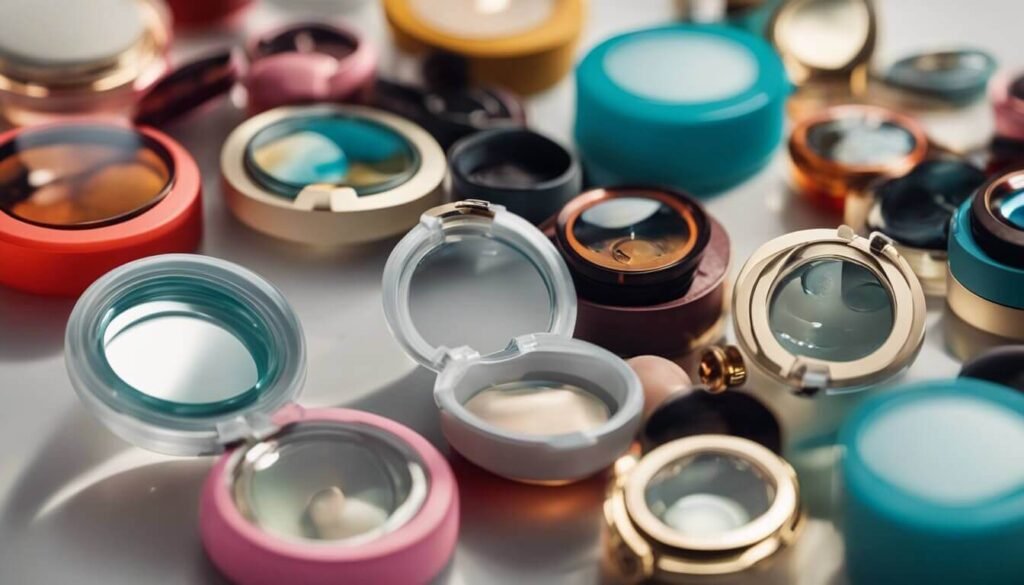
Managing Dry Eyes for Contact Lens Wearers
Got dry eyes but love your contacts? You’re not alone! For sure, you can make it work. Remember to keep those peepers moist and clean, and chat with your eye doctor if things get tricky.
They’ve got the know-how to help you out. So go ahead, give your eyes some TLC and stay comfy in those contacts!
Treatment and Management of Dry Eyes
Having dry eyes can make wearing contacts tough. But with the right care, you can still pop in those lenses and feel good.
- Get special drops made for contacts. These drops moisten your eyes and make wearing lenses way more comfy.
- Take breaks from your lenses. Let your eyes breathe by rocking glasses every now and then.
- Blink a lot. It’s like giving your eyes a mini shower every few seconds.
- Go for contacts that love water. Some lenses are super soft because they hold onto moisture really well.
- Clean your lenses like it’s your job. Dirty contacts can bug your eyes more when they’re already dry.
- Look at blinking exercises. Yes, that’s a thing – and it helps push out the natural tears to keep things smooth.
- Talk to your eye doc about plugs for your tear ducts. Sounds wild, but it keeps the wet stuff around longer.
- Try not to hang out in windy or smoky spots if you can help it. Those places are no friends to dry eyes.
- Give yourself an eye spa day with warm compresses sometimes. It feels good and calms down the dryness.
- Drink lots of water! Your whole body loves it, especially your thirsty eyes.
Lifestyle Changes and Eye Care Tips
Dry eyes can be a pain when you want to wear contacts. But don’t sweat it, there are ways to keep those peepers comfy.
- Splash your face with cool water in the morning. It wakes up your eyes and keeps them moist.
- Blink more often, especially when looking at screens. This spreads tears evenly over your eyes.
- Turn down the heat and use a humidifier. Warm air dries out your eyes, but moist air helps.
- Eat foods rich in omega-3 fatty acids like fish or walnuts. These can improve eye moisture.
- Take breaks from screens every 20 minutes. Look away for a bit — it’s called the 20-20-20 rule.
- Wear sunglasses outside to protect from wind and sun, which can dry out your eyes.
- Try not to rub your eyes. It’s tempting but can make things worse.
- Stay hydrated by drinking plenty of water. This helps keep your whole body, including your eyes, well-lubricated.
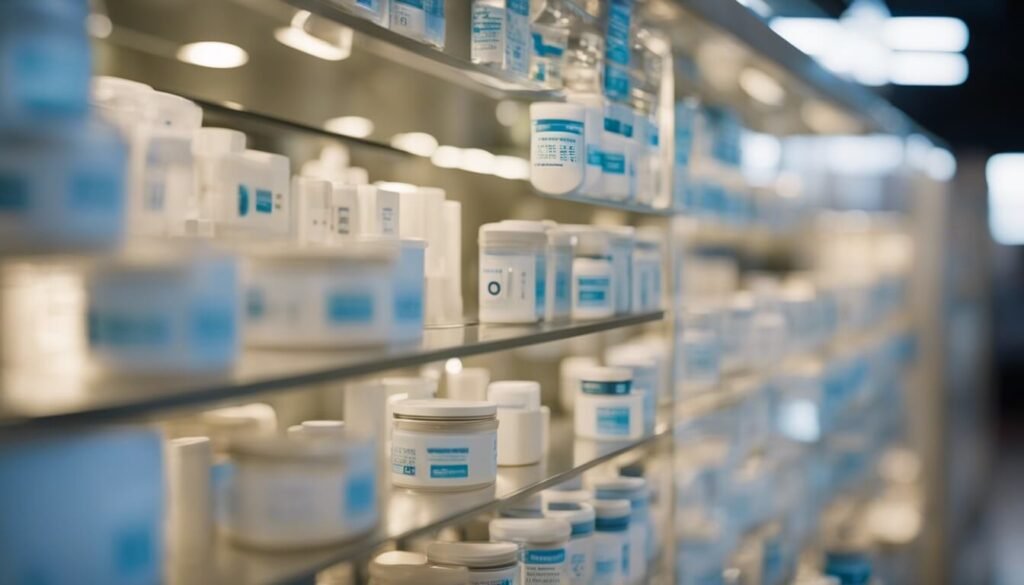
Preventive Measures and Best Practices
Keeping your contacts clean is super important. Dirt and germs can make dry eyes feel worse. So, make sure you wash your hands before touching your lenses. Use the right solution to clean them every time you take them out.
Eye drops are like a drink for your eyes when they get thirsty. If you wear contacts, pick drops that are safe for them. These special drops help keep your eyes wet and comfy while you rock those lenses! And hey, don’t overdo it with wearing contacts.
Give your peepers a break sometimes by wearing glasses instead.
Remember to blink often too—yup, it actually helps! Blinking spreads tears over your eyes, which keeps them from getting crabby and dry. Keep doing this especially if you’re staring at screens or reading for a long time; it’s like hitting the refresh button on a computer but for your eyeballs!
Proper Lens Care and Hygiene
Taking good care of your contact lenses is key to keeping your eyes happy. Clean and safe lens habits help you avoid dry eyes and discomfort. Here’s what you need to do:
- Always wash your hands before touching your contacts. Use soap, rinse well, and dry with a lint-free towel.
- Rinse your lenses with the right solution before putting them in and after taking them out. This keeps them moist and clean.
- Store contacts in a clean case with fresh solution every time. Old solutions won’t keep germs away as they should.
- Replace your contact lens case every three months—or sooner if it gets cracked or dirty.
- Follow the schedule for throwing away old contacts. Wearing them too long can cause dry eyes.
- Keep water away from your contacts. Don’t swim or shower with them on because water can hold germs that hurt your eyes.
- Never spit on your lenses to clean them. That sounds gross, but some folks do it! It’s not safe because your mouth has germs.
- Avoid using cream or lotion on your hands before handling contacts; they can mess up the lens surface.
- Use only the drops or solutions your eye doctor says are okay for contact lenses. Not all drops work with contacts.
Using Eye Drops and Artificial Tears
Eye drops and artificial tears can help if your eyes feel dry when you wear contacts. They add moisture and comfort to your eyes.
- Look for eye drops made for use with contact lenses. These won’t hurt your contacts while they make your eyes feel better.
- Use these drops before you put in your contacts. This can stop dryness before it starts.
- If your eyes still feel dry, it’s okay to use the drops during the day. Just check that they’re safe for contacts.
- Don’t use redness – reducing or whitening drops too much. They may not be good for you if used a lot.
- Preservative-free options are great if you have sensitive eyes; they come in single-use vials.
- Some people like gels or ointments at night, but don’t use them with contacts in.
- Always keep the tip of the dropper clean to keep germs away from your eyes.
- Listen to what your eye doctor says about which drops or artificial tears are best for you.
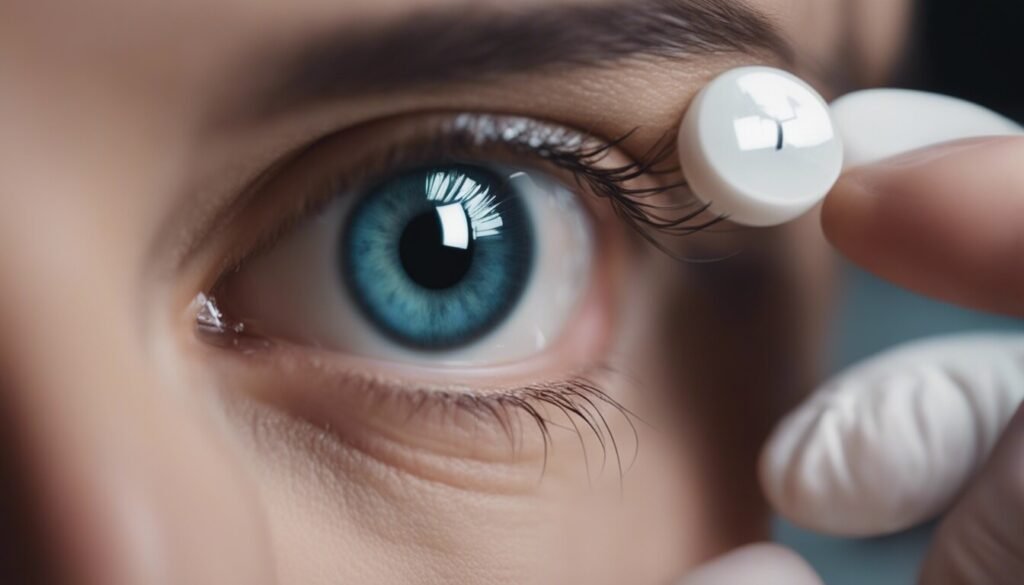
Alternative Solutions and Treatments
If your eyes feel like a desert, you’re not alone. Dry eye disease is a real pain, but hey, we can beat it together! Some doctors might tell you to try special treatments. Think of warm compresses or plugs that help tears stay on your eyes longer.
And if that doesn’t do the trick, there are always meds that kick those tear glands into gear.
On top of medical stuff, home remedies rock too! You’ve got options like blinking exercises – sounds funny, but they work – and staying away from smoke and wind. Always keep your eyes clean and give them breaks during screen time; your peepers will thank you for it!
Feeling better? Now go pick out some cool shades or maybe even some contacts made just for dry eyes with astigmatism. Trust me, they’re out there! Just make sure to chat with an eye pro before diving in—they’ll set you up right so you can say ‘see ya!’ to dryness while rocking those lenses!
Medical Treatments and Therapies
Sometimes, dry eyes need a doctor’s care. They might give you special treatments to make your eyes feel better. If drops from the store aren’t enough, don’t worry! Your eye doc has stronger stuff that can help a lot.
For people who wear contacts, these medicines can be like magic because they keep your eyes wet and comfy even with lenses in.
There’s this cool thing called punctal plugs too. Think of these as tiny stoppers for your tear ducts. They work by keeping more tears on your eye surface. This could be just what you need if your eyes are super dry with contacts in! And sometimes, doctors suggest treatments to zap inflammation that’s messing with tear production—so say goodbye to those itchy, red peepers and hello to happy contact lens-wearing days!
Lifestyle Adjustments and Home Remedies
If you’re dealing with dry eyes, small changes at home can make a big difference. Blink more often when you’re on the computer or reading. This helps keep your eyes wet. Turn on a humidifier to add moisture to the air in your room.
It’s like giving your eyes a drink of water!
Now, think about what you put in your body too. Drink lots of water and eat foods high in omega-3 fats, like fish and nuts. They are good for keeping eye dryness away.
For some quick relief, try warm compresses gently pressed on your eyelids. The heat helps release oils that keep tears from drying up too fast.
And hey—sunglasses are not just cool; they shield your peepers from wind and sun that can dry them out.
Just remember: if dry eyes bother you a lot, don’t guess what to do—go see an eye doctor! They know all about how to help folks who want to wear contacts with dry eye stay comfy and happy seeing clearly!

When to Consult an Eye Care Professional
Seeing an eye doctor is a good idea if your eyes often feel dry, painful, or red. They can find out why and offer the right help. You might need different contacts or special drops to make wearing them easier.
It’s really important to get checked if dryness stops you from seeing well or if your eyes get worse with contacts. Your doctor might suggest new kinds of lenses made just for dry eyes that could work better for you.
Sometimes you just can’t shake that icky feeling in your eyes, no matter what you try at home. That’s when it’s time to call up the eye care pro! They’ve got tools and tests to figure out the big picture and can guide you towards treatments like medical therapies or lifestyle tweaks that’ll bring back the comfort while rocking those contacts.
Don’t wait too long—keeping those peepers happy means staying on top of any changes before they turn into bigger issues.
Recognizing Severe Symptoms
Dry eyes can hurt, and sometimes they tell you it’s time to get help. Your eyes might feel like something is in them, or they get red and puffy. You may not see as well, or the lights seem too bright.
If drops don’t help, the dryness gets worse, or your eyes look very red, these are bad signs.
You need to talk to an eye doctor if things get really bad. Think about how often you blink—less blinking can make dry eyes worse when wearing contacts. And let’s be real; if putting in your contacts feels like a battle every morning, that’s your cue to reach out for some expert advice!
Personalized Eye Care Solutions
Everyone’s eyes are different, so it makes sense that eye care isn’t one-size-fits-all. Your eye doctor can help find just the right contacts for you, even with dry eyes. They might suggest special types of lenses made for keeping your eyes moist.
Or maybe they’ll spot a health issue or an allergy that’s part of the problem.
Contact lens wearers don’t have to suffer from dryness! There are drops and solutions made to work with contacts to ease dry eye symptoms. Plus, doctors know all about fancy lenses like scleral contact lenses that rest on the white part of your eye, giving extra comfort.
If regular contacts bug you, there could be another kind that feels better and helps you see clearly without making your eyes feel tired or red.
Conclusion
So, wearing contacts with dry eyes? It’s doable! Remember to pick the right lens and use drops if needed. If your eyes feel scratchy or you’re blinking a lot, chat with an eye doctor.
They’ll help make sure your peepers stay happy while you keep rockin’ those lenses. Keep on smiling and blinking – but mostly smiling!
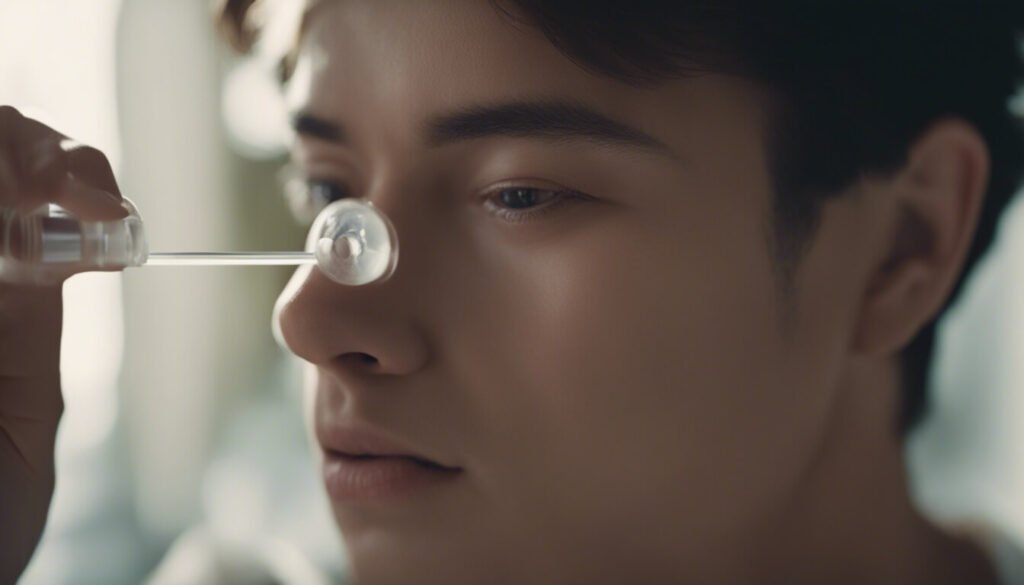
FAQ
Q: What is dry eye disease?
A: Dry eye disease is a common condition that occurs when your tears are unable to provide adequate lubrication for your eyes. This can lead to discomfort, irritation, and even vision problems.
Q: What are the causes of dry eye?
A: There are several factors that can contribute to dry eye, including aging, certain medical conditions, environmental factors, and prolonged use of digital devices.
Q: Can I still wear contacts if I suffer from dry eye?
A: Yes, there are contact lens options specifically designed for individuals with dry eye. Scleral contact lenses and certain types of hydrogel lenses can help alleviate dry eye symptoms.
Q: What are the best types of contact lenses for dry eyes?
A: Scleral contact lenses and gas-permeable contact lenses are often recommended for individuals with dry eye, as they provide better oxygen flow and retain moisture better than traditional soft lenses.
Q: How can I alleviate dry eye symptoms when wearing contact lenses?
A: Using lubricating eye drops, practicing proper contact lens hygiene, and considering specialized contact lens solutions can help reduce dry eye symptoms associated with wearing contact lenses.
Q: What are some tips for wearing contact lenses with dry eye?
A: It’s important to properly clean and care for your contact lenses, use lubricating eye drops as needed, and follow your eye care professional’s recommendations for managing dry eye while wearing contacts.
Q: Can contact lens-related dry eye be managed?
A: Yes, by choosing the right type of contact lenses, practicing good lens hygiene, and making lifestyle adjustments, many individuals can effectively manage dry eye symptoms while wearing contacts.
Q: Is it safe to wear contacts with dry eyes?
A: With the proper precautions and guidance from your eye care professional, it is generally safe to wear contacts even if you experience dry eye. However, it’s important to monitor your symptoms and prioritize eye health.
Q: How can I learn to wear contact lenses with dry eye?
A: Consulting with your eye care professional is essential for learning how to wear contact lenses with dry eye. They can provide guidance on the best lens options and proper care techniques.
Q: What are some ways to reduce dry eye symptoms when wearing contact lenses?
A: In addition to using lubricating eye drops and practicing good lens hygiene, considering specialized types of contacts, such as scleral or hydrogel lenses, can help reduce dry eye symptoms associated with contact lens wear.



